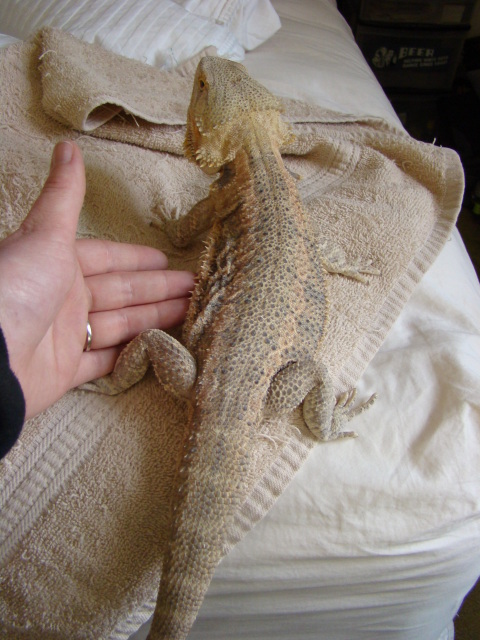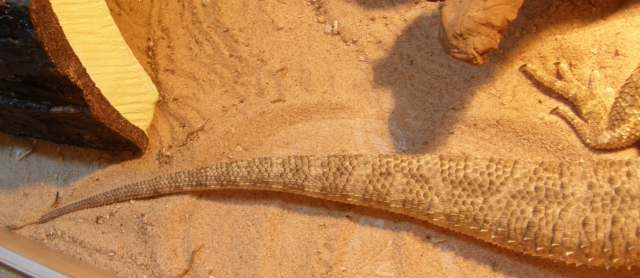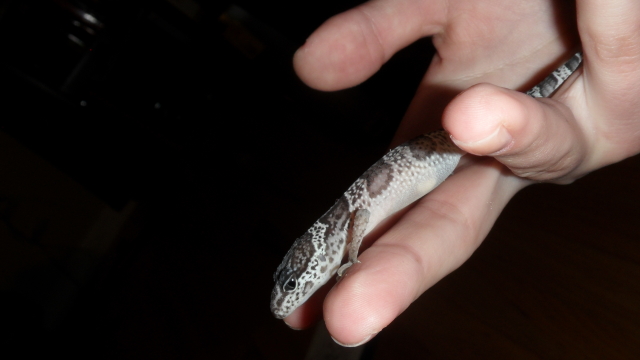QuestionWe've had a pretty good sized uromastyx (10") for about 3 months. We bought her from a pet store. She has developed blisters on her back, took her to a vet yesterday and the best the vet could tell, the blisters came from the heat lamp. We bought a smaller heat lamp today, but as I measured the temp of the old and new, neither got up to the recommended temps (101 degrees F basking). She developed more blisters today. She is on an antiobiotic & calcium supplement. I just don't see how this desert dweller could be getting so hot as to develop blisters when it doesn't even seem like it gets to 90 degrees on her ground level. Have you had any experience with this, or can you direct me somewhere?
AnswerAre you using a UVB source? You should be. But if you are, then it is likely you either have moved the lamp too close, against recommeded safe mounting distance, or the bulb is defective. A separate heat source should be used if a UVB source mounted at the recommended height does not provide enough heat. Either way, it does sound like thermal or UV radiation burns. If you are using a compact fluorescent lamp I recommend you trash it, as there have been some reported injuries to reptiles lately by faulty compact coil UVB lamps.
Even though the temp may not be what you want at the basking area, are you measuring at the substrate surface? The lizard may also be climbing to get higher and getting burned. The only other explanation off hand is possibly a parasite, but not likely in an arid terrarium.
I recommend against antibiotic and calcium supplements without knowing WHAT you are dealing with. This sounds like another knee jerk prescription by a vet who doesn't know what he's looking at. This sort of impulsive drug prescribing has a great possibility of doing more harm than good. Many people each year loose their herps by following such courses prescribed by vets to medicate reptiles without knowing what for.
Hypocalcemia is not a likely diagnosis, and even if he thinks so, he should do a serum calcium test first. Supplementation is ok, but most people ( and vets ) use it far too much. This is dangerous because overuse of calcium can cause a lot of problems as well. I recommend a light dusting of food with a calcium supplement twice monthly, and no more than once a week.
Antibiotics can be far more dangerous if you don't know what you are treating. A favorite of vets to overprescribe is Baytril ( enrofloxacin ). This has resulted in explosive bacterial mutation against this class of drug. This drug also is known to destroy joint tissue, and like any other drug, needs to be filtered, and this can cause hardships on kidneys and the liver. It is best not to use it on just a hunch or preventative measure. If you want to, then have the vet do a culture for the suspected pathogen(s). Or at least switch to a 3rd or 4th gen. chephalosporin that has fewer risks associated with use.
anapsid.org

 scared, lethargic and not eating beardie- Came on suddenly
QuestionQUESTION: Ive had Brutus- a bearded dragon for
scared, lethargic and not eating beardie- Came on suddenly
QuestionQUESTION: Ive had Brutus- a bearded dragon for
 Off balance beardie?
QuestionQUESTION: So im quite worried at the moment, wi
Off balance beardie?
QuestionQUESTION: So im quite worried at the moment, wi
 Latte - Status
QuestionQUESTION: Tracie,
Apparently I ask too many qu
Latte - Status
QuestionQUESTION: Tracie,
Apparently I ask too many qu
 Juvenile Green Crested lIzard
QuestionQUESTION: Hi, I just got a wild caught green cr
Juvenile Green Crested lIzard
QuestionQUESTION: Hi, I just got a wild caught green cr
 bearded dragon glass dancing
Question
glass dancing
we have a bearded dragon
bearded dragon glass dancing
Question
glass dancing
we have a bearded dragon